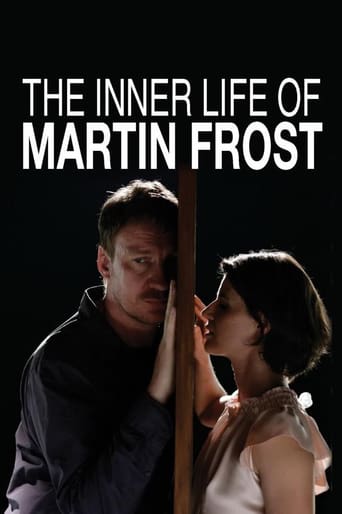Sindre Kaspersen
He wanted to get back on track after finishing his newest book, but woke up to the sight of a woman who would change his life forever.Writer Martin Frost has recently finished writing his new book. Tired and in need of rest he travels from New York to a small house on the countryside that he has borrowed from some friends. After a few days with uninterrupted silence the writer in Martin begins to awake. An idea to a new book sets Martin's mind in motion and suddenly he is writing again. Martin is back in his right element, but when he wakes up the next morning, he is startled by the sight of a beautiful woman lying next to him. In the start Martin is sceptical to the strange guest, but the woman's strange though charming and attractive personality awakens Martin's passionate feelings. A relationship quickly arises between the two strangers, but Martin is quick to realize that there are many unanswered questions about the woman's identity. Writer of well-known books such as "The New York-Trilogy" (1987) "Moon Palace" (1989) and "The Music of Chance" (1990) is back with a delicate adaptation of one of his own writings. This aesthetic and surreal love fable is told with chronological narrative, a mysterious all-knowing voice-over narration and filmed within restricted frames, quiet pace, close-ups, short takes and varied perspectives. The startling and thought-out screenplay explores themes like solitude, love, fantasy, hope, dreams and passion, and the films atypical universe is created by enchanting characters, colorful and sterling cinematography and strange conversations. Paul Auster's independent film only has four characters and therefore much of the responsibility is laid on the actors' ability to create complementary and interesting character portraits. David Thewlis and Irène Jacob both work splendidly in the films two essential roles, but even though Michael Imperioli and Sophie Auster also delivers fine interpretations, their characters significance is discussable."The Inner Life of Martin Frost" is above all a sensing and atmospheric experience. Paul Auster experiments with the characters embodiment and the narratives versatility in an original and exploring way that creates interest and curiosity. He frequently takes us out of the plot and focuses on the beauty of nature, which gives the viewer's time to reflect. As the title implies this is a movie that lives more inside the main character's mind than in the real world he has drawn himself away from. This movie could probably be somewhat weird to many viewers considering it's unorthodox style, but there is a spark and warmth in this sophisticatedly minimalistic film which makes it a charming movie experience.
mgdu
what motivated me up to the new director's festival to catch 'martin frost' tonight was the brutal review that it got yesterday from the lead critic of the new york times, brutal dismissal, to be more accurate, 'the less said about (it) the better', she said, and i figured that any movie able to teach Ms Dargis the virtue of silence for even a few column inches would be worth the trip. and worth the trip it was. we are brought into a paradise of limpidly beautiful visual textures. the oaken rhythms of a country house ensconced in a springtime parkland of luxuriant trees and luminous skies bestow the soothing natural blessing needed by the main character, martin frost (David Thewlis), a writer rubbed raw by the mechanics of finishing a novel in new york city. (Thewlis makes palpable the casualty of intrapsychic machinery sawed into daemonic reverb against the banausic hive). then paradise morphs into purgatory, leavened comedically, in Dante's sense, by the postmodern angelic visitations of Claire (Irene Jacobs) and Anna (Sophie Auster). unfortunately, to my taste, the verbal dimensions of the film are flaccid, the logic more fanciful than imaginative, the narrative arc crippled by some irredeemably creaky plotting, especially at the crucial initiation of the relationship between martin and Claire where the seeds of common sense are thrown to the magpies of theatricality.but so beguiling is the willful vulnerability of auster's fantasy, and the edgy interplay that it potentiates between Thewlis and Jacobs, and the camera, and later Sophie Auster, and the broad comedy of a rural everyman (Michael Imperioli), that it is very pleasant to be carried along on the visual foam of uncertain sensual delight, eddying into a feeling that this film's oddly louche light touch is uniquely adept at tracing some grave lineaments of the human heart.go innocently.
rasecz
After spending three years writing his latest novel, Martin Frost is ready for some R&R. A friend lends him a country home. Martin settles in to enjoy some solitude. Yet his writer's mind is not quiet and new ideas for novels pop up. He embarks on a forty page short story. What results is the film.The architecture is that of embedded stories: a writer writes about a writer that writes about... The execution is through the conventional trick of dreams. Within dreams, anything goes and the real can be abandoned. And there is where the film began to rub me.Apparitions, spells and ghosts are not my cup of tea. Granted the story has clever elements and some humorous moments provided by the Fortunato character. But overall the film falls flat.The story is supposed to take place somewhere in the US. However I could not square the odd vegetation with any place in North America. The credits solve the mystery. The film was shot in Portugal.The best thing about this film is the music by Petitgand, especially the piano parts. Lovely music!


